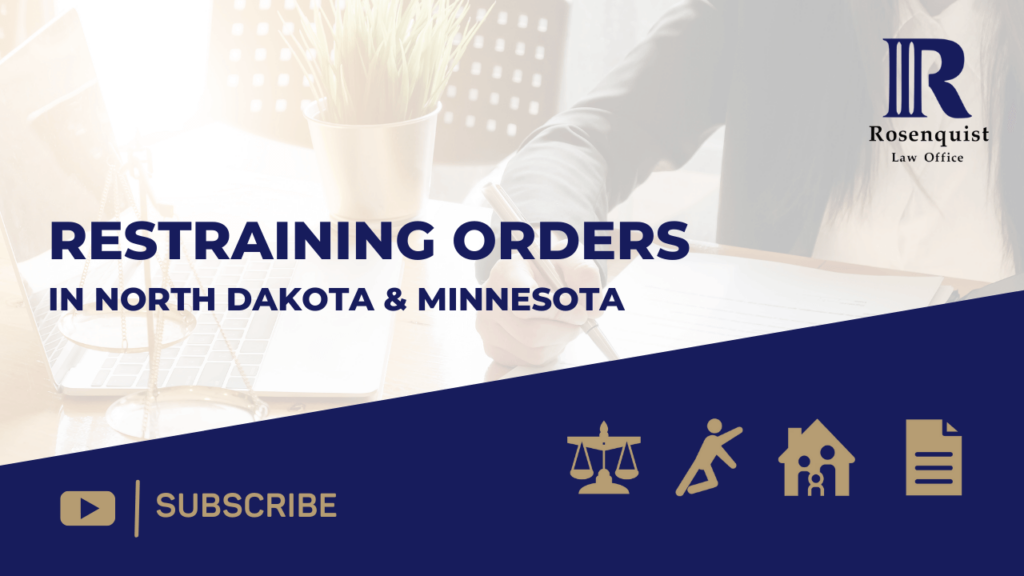Are you thinking of bringing a lawsuit against another party? Did someone bring a lawsuit against you? You might be asking the following questions: What can you do to defend yourself? What evidence can you provide to support the claim? What evidence can you provide to defend yourself against the claim?
Evidence is what can be used to help either prove or invalidate an allegation made by one party against another. Evidence comes in many forms: written documents, emails, photographs, audio recordings, video surveillance, written statements, verbal statements, and more.
In a legal setting, the term “evidence” is also known as “discovery.” These terms are often used interchangeably by attorneys. Simply put, discovery is the legal term for the procedure of discovering or learning of evidence in a case.
Discovery is commonly presented in civil cases, family law cases, and criminal cases. Part I of How to Gather Evidence in North Dakota will focus on the civil and family law aspect of discovery. In Part II, we will focus on how to compel discovery in criminal cases.
How Do You Obtain Discovery in North Dakota?
Rule 26 of the North Dakota Rules of Civil Procedure is the general rule that governs discovery. This rule identifies the varying methods of obtaining discovery, the general scope and limits, and the sequence and timing of discovery. Let’s focus on the varying methods of obtaining discovery in accordance with Rule 26(a).
- Written Interrogatories
Rule 33 of the North Dakota Rules of Civil Procedure, which governs interrogatories, are written questions sent from one party of the lawsuit to the adverse party. The party who receives the interrogatories request has to provide written answers to the questions. The party generally has 30 days to respond to the interrogatories and/or provide objections to certain questions. However, if the interrogatories are served at the same time as the “Summons” and “Complaint,” the Defendant of the suit is not required to serve answers until 45 days after service of such documents.
- Requests for Production of Documents
Rule 34 of the North Dakota Rules of Civil Procedure governs Requests for Production of Documents, which are written requests for specific documents sent by one party of the lawsuit to the adverse party. The party is only required to provide documents of relevance to the case within its possession. Like Interrogatories, the party generally has 30 days to respond and/or provide objections to certain questions. However, if the production of documents are served at the same time as the “Summons” and “Complaint”, the Defendant of the suit is not required to serve answers until 45 days after service of such documents.
- Requests for Admissions
Less commonly seen are Request for Admissions. Rule 36 of the North Dakota Rules of Civil Procedure governs Requests for Admissions, which are written statements sent by one party of the lawsuit to the adverse party. These generally ask the responding party to either “Admit” or “Deny” the requested statement (Ex. “Admit or deny that you used illegal substances within the last six months.”) The party’s deadline to provide answers to the requests for admissions are the same as the above-referenced discovery methods.
- Depositions
Rule 30 of the North Dakota Rules of Civil Procedure covers depositions. Depositions are questions asked to a party by the other party (or party’s attorney) under oath and recorded by a Court Reporter. The deposition is then transcribed and made available to the parties, and, if necessary, the Court. Less common than Rule 30, Rule 31 of the North Dakota Rules of Civil Procedure provides the option for the deposition to be completed through written questions.
- Physical and/or Mental Examinations
Rule 35 of the North Dakota Rules of Civil Procedure governs Physical or Mental examinations that can be used as evidence within a lawsuit. If the physical or mental condition of the adverse party is at issue, the Court may grant a request to have the adverse party undergo an examination. The party requesting the examination must, in good faith, file a motion with the Court explaining the good cause for the examination with identifiers of the scope, time, place, manner, conditions and conductor(s) of the specified examination.
If you are looking at initiating a lawsuit, are currently the defendant in a lawsuit, and have questions pertaining to discovery, contact Rosenquist Law Office by phone at (701) 775-0654, or email us at lawinfo@rosenquistlawoffice.com to schedule a free consultation. Our office has attorneys available twenty-four hours a day. *The information contained in this article and on this website is for informational purposes only. This information is not legal advice and should not be relied upon as such.



